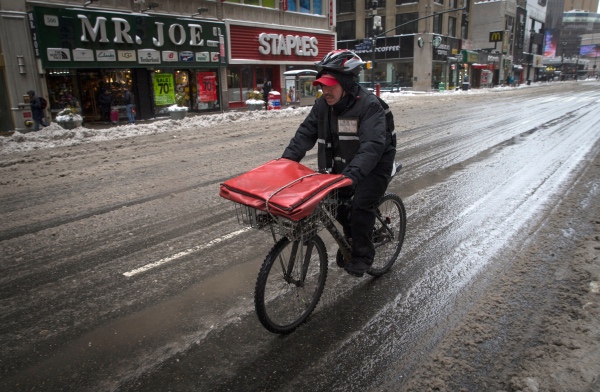Tbilisi, Georgia
Thomson Reuters Foundation
Facebook photos and food delivery data could replace expensive surveys and wills in helping billions of people worldwide prove they own their home, researchers said on Wednesday.
Globally, an estimated five billion people lack the proof of ownership needed to access services, get loans, pass on property or reclaim it after being forced out by war or natural disaster.

A pizza delivery man rides on a bicycle on 8th avenue in New York city as the city slowly returned to normal after being hit by winter storm Juno on 27th January, 2015. PICTURE: REUTERS/Mike Segar
Yet, from social media to ride-hailing services, many tech firms have an accurate idea of their users’ main address, based on where they tag photos or regularly get deliveries, according to analysts at New America, a US-based thinktank.
“With the proliferation of sensors and data, we are starting to leave data trails,” said Yuliya Panfil, director of New America’s property rights programme.
Government agencies normally only accept documents such as survey plans or notarised wills as proof of ownership but these are often expensive or hard to get, the group said in a report.
But letting people present certified data records downloaded from tech firms – for example Google Maps’ GPS history of where a user sleeps – could provide a valid alternative, it said.
“None of these pieces of evidence on their own is very convincing, but the ability to collect them together…is what makes this tapestry of evidence more convincing,” said Panfil.
Such a system could be particularly useful in rapidly growing cities and middle-income countries like Colombia or Georgia, where more people have access to smartphones, she said.
Researchers at McGill University in Canada have been testing a similar approach, using social media postings – as well as anecdotal evidence – to help people who flee conflict areas reclaim their property post-war.
“You can get around the fact that a title or a deed in many cases was never held by a person that fled, and when it was, often they didn’t take it with them,” said Jon Unruh, an associate professor at the university’s department of geography.
Unruh’s team has been conducting research in South Sudan, northern Iraq and Syria, and is aiming to create a platform for refugees to upload evidence of property claims, he said.
Yet, a major challenge would be distinguishing occupation from ownership, as long-term renters or squatters could potentially amass enough evidence to make an ownership claim, according to New America.
“This is a question administrative agencies will have to grapple with,” the group wrote in the report.





